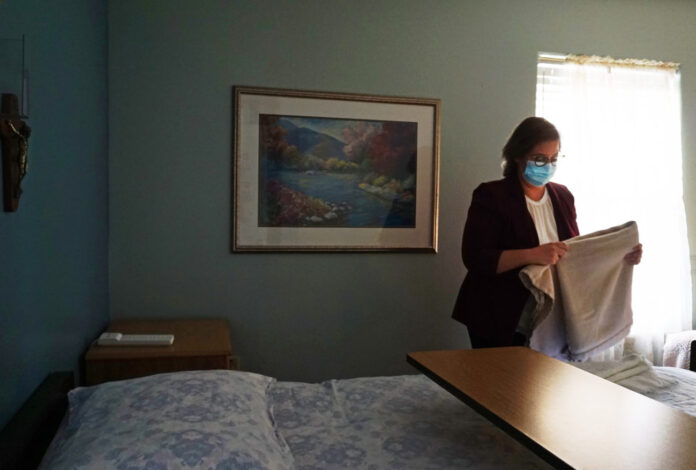Sunshine Haven Inc, a nonprofit, licensed special care facility in Olmito that provides free, compassionate end-of-life care to terminally ill patients in a home-like setting, has seen its referrals plummet due to COVID-19.
Veronica Lucio, the facility’s executive director, said Sunshine Haven got four to six referrals a week from hospice agencies and had a constant waiting list before the pandemic. As of Tuesday it had zero referrals for the week, while more often than not these days, families back out after the initial discussion, she said. This week Sunshine Haven was completely empty of residents, Lucio said.
The nonprofit facility, founded 19 years ago, partners with hospice agencies, which make referrals on behalf of families of terminally ill patients in cases who can’t afford traditional hospice care alternatives. Sunshine Haven follows all the directives of the hospice agency physician and provides round-the-clock care for the patient, Lucio said.
In speaking with administrators at a number of hospice agencies, however, she keeps hearing the same thing: Families are afraid of moving their dying loved ones into a facility because they’re afraid they won’t be allowed to visit and they’re worried about catching the virus. Lucio said she was surprised to learn that families’ biggest fear is not being able to visit their loved ones in hospice care.
Sunshine Haven’s hours have changed and protocols have been in place due to the pandemic, but family members can still visit their loved ones who are staying there, Lucio said. This allowance is stipulated by Centers for Medicare and Medicaid Services rules that oversee end-of-life facilities, she said.
“ Not only is it allowed, it’s important,” Lucio said. “It’s an important part of end of life for the family and for the patient, and so we do allow visitors.”
Sunshine Haven’s visiting hours are now 10 a.m. to 2 p.m. and 4 p.m. to 7 p.m. The two-hour interim is devoted to disinfecting the premises. One visitor at a time is allowed inside except in the case of elderly or emotionally fragile family members who need to be accompanied. All visitors must pass the facility’s COVID-19 screening protocols before gaining entrance, Lucio said.
“ We educate them when they arrive,” she said. “We don’t want to deny visitation to anyone.”
Families are free to take their loved ones out of Sunshine Haven anytime they choose.
Lucio said staff have received special training in preventing the spread of COVID-19 and several physical changes have been made to the facility as well to protect patients, family members, health care professionals and staff. In March, when the pandemic first hit, CMS protocols were immediately put in place, she said.
“ As we went into April we did close for eight weeks,” Lucio said. “It was out of an abundance of caution and also giving us time to really track this and research and consult with experts. I did not want to open the facility until they’d done everything possible to safeguard it.”
With the guidance of veteran epidemiologists Dr. Joseph McCormick and his wife, Susan Fisher-Hoch, Lucio conducted a virtual tour of Sunshine Haven and all its HVAC units. At the time, the Centers for Disease Control and Prevention were saying the virus was spread only through droplets, though McCormick and Fisher-Hoch had a strong sense based on what was coming out of their research community that it could also be aerosol-borne. That led to the facility installing UV lightning and high-grade filters in all its ventilation systems, redirecting return air from patient rooms to the outdoors via exhaust fans, Lucio said
The facility reopened June 1. The staff is equipped with full Personal Protective Equipment — face shields and goggles, N95 and surgical masks, isolation gowns and gloves — courtesy of the state, which Lucio described as a “huge blessing.”
Sunshine Haven has produced mailers in English and Spanish to get the word out that they’re available, the services offered and virus-mitigation efforts taken, and is also working on videos in Spanish and English, she said. The facility also offers bereavement counseling. Lucio said the best thing about Sunshine Haven is that it gives families a chance to make arrangements knowing that their loved ones are being cared for in a safe environment.
“ I understand, because I’m a brain cancer survivor,” she said. “I know what it’s like to have to have those conversations with family members. I know what it’s like to have to decide, if you’re the patient, who you’re going to live with, who’s going to take care of you. I know what it’s like to have your autonomy and privacy — you feel like it’s taken from you. … I also know what it’s like for the family members, because I’ve watched my parents and my brothers and sisters have these conversations with me, or with each other about me, and the burden that they carried.”
George Olivo, board president for Sunshine Haven, said “becoming a primary caregiver for a terminally ill patient is incredibly difficult.”
“ The families choosing at-home health often place themselves and their families through great emotional, physical and financial hardships,” he said. “We would like these families to know that Sunshine Haven Inc. is open for their families, and we are eager to help them relieve these hardships.”
sunshinehaveninc.org





